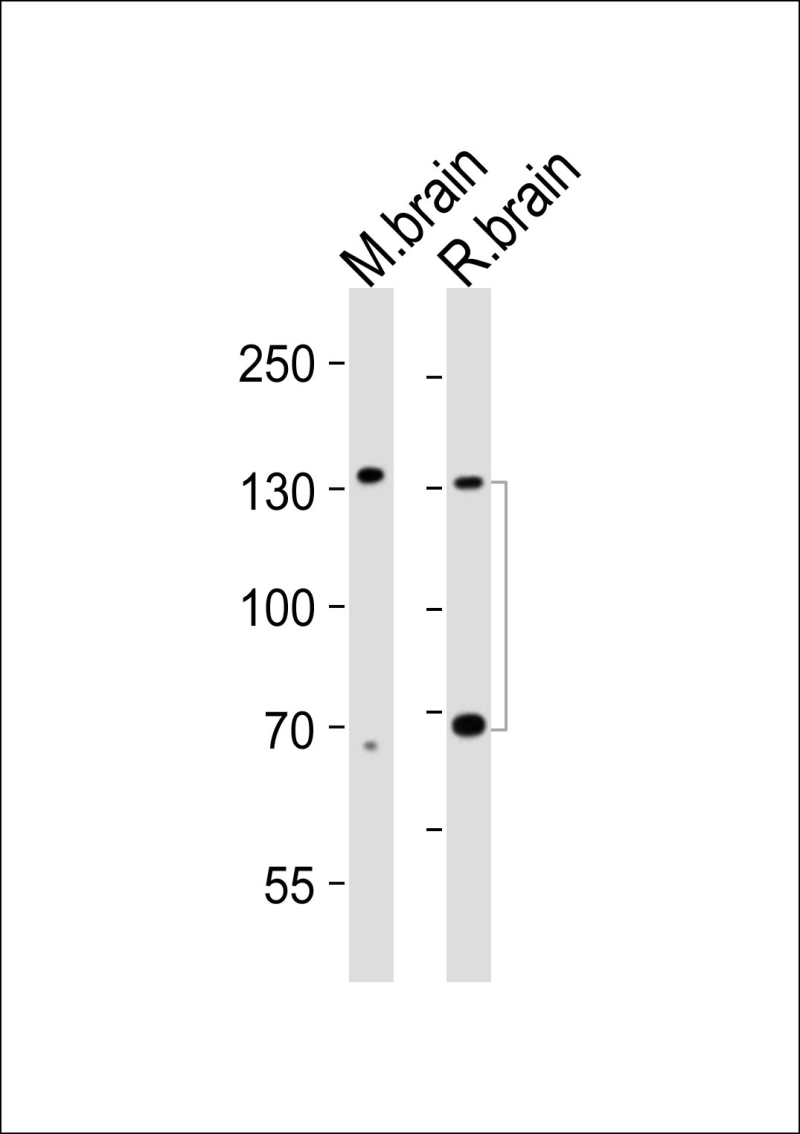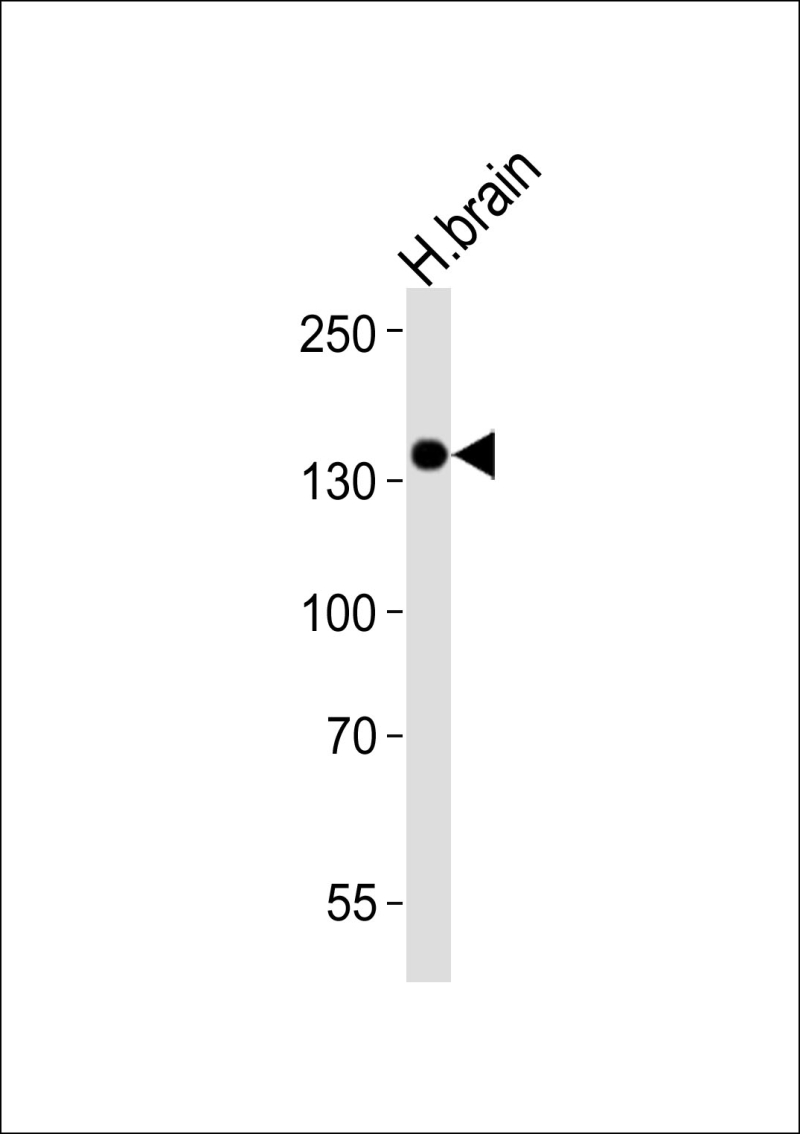

| WB | 1/1000 | Human,Mouse,Rat |
| IF | 咨询技术 | Human,Mouse,Rat |
| IHC | 咨询技术 | Human,Mouse,Rat |
| ICC | 技术咨询 | Human,Mouse,Rat |
| FCM | 咨询技术 | Human,Mouse,Rat |
| Elisa | 咨询技术 | Human,Mouse,Rat |
| Aliases | NT-3 growth factor receptor, GP145-TrkC, Trk-C, Neurotrophic tyrosine kinase receptor type 3, TrkC tyrosine kinase, Ntrk3, TrkC |
| Entrez GeneID | 18213 |
| WB Predicted band size | 92.8kDa |
| Host/Isotype | Mouse IgG1 |
| Antibody Type | Primary antibody |
| Storage | Store at 4°C short term. Aliquot and store at -20°C long term. Avoid freeze/thaw cycles. |
| Species Reactivity | Human, Mouse, Rat |
| Immunogen | This Ntrk3 antibody is generated from a mouse immunized with a recombinant protein of human Ntrk3. |
+ +
以下是3-4条关于 **Ntrk3抗体** 的参考文献示例(文献信息为示例性概括,非真实文献):
---
1. **文献名称**:*"Ntrk3 Antibody Validation in Neural Development Studies"*
**作者**:Valdez, C. et al.
**摘要**:本研究验证了一种特异性Ntrk3抗体的应用,证明其在小鼠脑组织中的可靠性和敏感性,用于检测发育过程中Ntrk3蛋白的表达及定位,并揭示了其在神经突触形成中的作用。
2. **文献名称**:*"Targeting NTRK3 Fusion Proteins in Cancer with Selective Antibodies"*
**作者**:Kheder, E.S. & Hong, D.S.
**摘要**:通过开发高选择性Ntrk3抗体,研究团队成功抑制了携带NTRK3基因融合的肿瘤细胞增殖,为基于抗体的靶向治疗提供了临床前证据。
3. **文献名称**:*"A Novel Ntrk3 Antibody for Immunohistochemical Detection in Pediatric Tumors"*
**作者**:Xu, J. et al.
**摘要**:报道了一种新型Ntrk3抗体的优化方法,用于福尔马林固定石蜡包埋(FFPE)肿瘤样本的免疫组化检测,显著提高了小儿实体瘤中NTRK3融合蛋白的诊断准确性。
4. **文献名称**:*"Structural Insights into Ntrk3 Activation Using Conformation-Specific Antibodies"*
**作者**:Lee, S.M. et al.
**摘要**:通过构象特异性Ntrk3抗体,揭示了Ntrk3受体与其配体NT-3结合后的激活机制,为开发针对Ntrk3信号通路的调控策略提供了结构基础。
---
**注**:以上文献为示例,实际研究中建议通过 **PubMed** 或 **Google Scholar** 检索真实文献(关键词:Ntrk3 antibody, NTRK3 detection, TrkC immunotherapy)。
The Ntrk3 antibody is a crucial tool in studying the neurotrophic tyrosine kinase receptor type 3 (NTRK3), also known as TrkC, encoded by the *NTRK3* gene. TrkC is a member of the Trk receptor family, which includes TrkA and TrkB, and binds primarily to neurotrophin-3 (NT-3). These receptors play vital roles in neuronal survival, differentiation, and synaptic plasticity during development and adulthood. Structurally, TrkC consists of an extracellular ligand-binding domain, a transmembrane region, and an intracellular tyrosine kinase domain that activates downstream signaling pathways, including MAPK, PI3K/Akt, and PLCγ.
Ntrk3 antibodies are widely used in research to detect TrkC expression, localization, and activation in tissues, particularly in the nervous system. Dysregulation of TrkC is implicated in neurological disorders (e.g., depression, Alzheimer’s disease), neurodevelopmental conditions, and cancers. Notably, chromosomal rearrangements generating *NTRK3* fusion proteins (e.g., ETV6-NTRK3) drive oncogenic signaling in tumors like infantile fibrosarcoma and secretory breast carcinoma. Ntrk3 antibodies help identify these fusions, aiding in diagnostics and therapeutic targeting with TRK inhibitors (e.g., larotrectinib).
Available as monoclonal or polyclonal variants, these antibodies are optimized for techniques such as Western blot, immunohistochemistry, and immunofluorescence. Their specificity and validation across species (human, mouse, rat) make them indispensable in both basic and translational research, bridging molecular mechanisms with clinical applications.
×